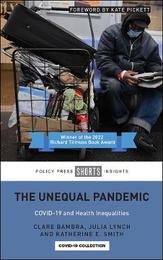
|
The Unequal Pandemic: COVID-19 and Health Inequalities
Paperback / softback
Main Details
| Title |
The Unequal Pandemic: COVID-19 and Health Inequalities
|
| Authors and Contributors |
By (author) Clare Bambra
|
|
By (author) Julia Lynch
|
|
By (author) Katherine E. Smith
|
| Physical Properties |
| Format:Paperback / softback | | Pages:198 | | Dimensions(mm): Height 203,Width 127 |
|
| ISBN/Barcode |
9781447361237
|
| Classifications | Dewey:362.1962414 |
|---|
| Audience | | Professional & Vocational | |
|---|
| Illustrations |
4 Tables, black and white; 2 Illustrations, black and white
|
|
Publishing Details |
| Publisher |
Bristol University Press
|
| Imprint |
Policy Press
|
| Publication Date |
15 June 2021 |
| Publication Country |
United Kingdom
|
Description
Rated as a top 10 book about the COVID-19 pandemic by New Statesman: https://www.newstatesman.com/culture/2021/07/best-books-about-covid-19-pandemic EPDF and EPUB available Open Access under CC-BY-NC- ND It has been claimed that we are 'all in it together' and that the COVID-19 virus 'does not discriminate'. This accessible, yet authoritative book dispels this myth of COVID-19 as an 'equal opportunity' disease, by showing how the pandemic is a syndemic of disease and inequality. Drawing on international data and accounts, it argues that the pandemic is unequal in three ways: it has killed unequally, been experienced unequally and will impoverish unequally. These inequalities are a political choice: with governments effectively choosing who lives and who dies, we need to learn from COVID-19 quickly to prevent growing inequality and to reduce health inequalities in the future. COVID-19 is an unequal pandemic.
Author Biography
Clare Bambra is Professor of Public Health, Population Health Sciences Institute at Newcastle University. Katherine Smith is Professor of Public Health Policy at University of Strathclyde. Julia Lynch is Professor of Political Science at University of Pennsylvania.
Reviews"This vital book doesn't just show the inequality of COVID-19's consequences, it demonstrates how inequalities have undermined the response. It exposes them as political choices, and sets out the policies to beat inequality, COVID-19, and the pandemics to come. " Ben Phillips, author, How to Fight Inequality, and advisor to the United Nations "An important compendium of patterns of inequalities from COVID itself, the lockdown and the economic impacts." James Dunn, McMaster University "The fallout from the pandemic will be felt for years - and hurt the worse off in society the most. For anyone concerned about prevention, this compelling book is where to start." Margaret Whitehead, University of Liverpool "This book may become a modern classic. It shows how and why pandemics hit societies unequally and brings clarity to one of the biggest public health challenges of our time. It is a must-read for scholars and students across all scientific fields, and for all those in search of tools that can protect our populations during pandemics". Professor Terje Andreas Eikemo, Centre for Global Health Inequalities Research (CHAIN), E-i-C, Scand J Public Health "A brilliant dissection of the COVID-19 pandemic. The authors paint a picture of its unequal health, economic and social impacts and conclude with hopes for a brighter future." Fran Baum, Southgate Institute for Health, Society and Equity, Flinders University "If the COVID-19 pandemic taught us anything, it's that we are not all in it together. This concise and well argued study show how intersecting inequalities of income, race, work and space created a "syndemic" of immense damage. This book is a must-read for those who wish to repair the damage and create a more resilient and just society in the face of future pandemics." Scott Greer, University of Michigan "This book provides a clear and thorough account of how COVID-19 has exposed and is exacerbating deep seeded inequalities in our societies, and how this is impacting on what citizens value most, their health. An important read." Caroline Costongs, EuroHealthNet "Stands out not only for its unflinching analysis of COVID-19's syndemic layering of inequalities but for how this embodies a pathological political economy that must be transformed." Ronald Labonte, University of Ottawa
|